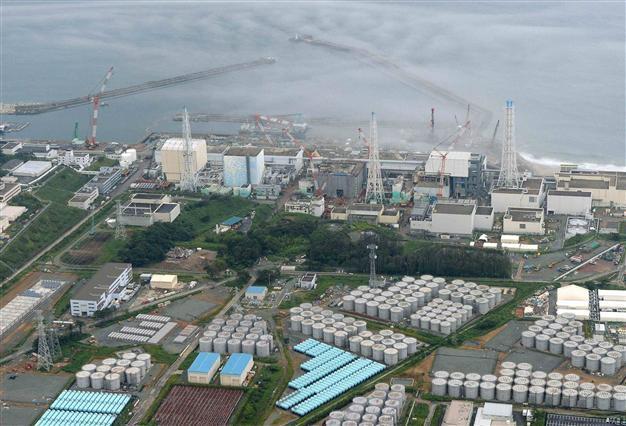Britain to build Europe's first nuclear plant since Fukushima
LONDON/PARIS - Reuters

An aerial view shows TEPCO's tsunami-crippled Fukushima Daiichi nuclear power plant in Fukushima in this file photo taken by Kyodo on August 20, 2013. REUTERS Photo
Britain is set to sign a deal with France's EDF for the first nuclear plant to start construction in Europe since Japan's Fukushima disaster raised safety concerns worldwide, at a cost estimated at around $23 billion.
Under the deal, expected to be announced on Monday, the French utility will lead a consortium, including a Chinese group, to construct two European Pressurised Water Reactors (EPRs) designed by France's Areva.
Industry estimates, based on other nuclear projects, put the cost at around 14 billion pounds or more than 16 billion euros.
EDF's long-time partner China General Nuclear Power Group (CGN), possibly in combination with China National Nuclear Corporation (CNNC), is expected to have a 30 to 40 percent stake in the consortium, with Areva taking another 10 percent, according to newspapers including France's Les Echos and Britain's Sunday Telegraph.
EDF and the British prime minister's office declined to comment on the media reports.
The two reactors, each with a capacity of 1.6 gigawatts, would together make up nearly five percent of British generating capacity and increase energy security in the country, which needs to replace 20 percent of its ageing and polluting power plants over the coming decade.
The project is a boost for the global nuclear industry, which has seen projects cancelled since the 2011 Fukushima disaster.
Germany decided to phase out nuclear power, Italy scrapped a planned nuclear programme and France has pledged to cut atomic power to 50 percent of its electricity mix from 75 percent today.
Britain's government and main opposition parties support nuclear power and anti-nuclear sentiment among the population is muted by comparison with other parts of Europe.
George Borovas, nuclear specialist at law firm Pillsbury, said Britain is a unique environment for nuclear, given political support, a relatively strong economy and an existing nuclear fleet.
"If nuclear can't work in the UK, where else?" he said.
Two other groups have put forward plans to build new nuclear plants in Britain and will be scrutinising the EDF deal closely: Japan's Hitachi via its Horizon project and the NuGen project of France's GDF and Spain's Iberdrola.
Huge risks Under the deal, the EDF-led consortium will build the two reactors at its own risk, but the government will guarantee a minimum price for power generated from the proposed Hinkley Point C plant in Somerset, southwest England, adjacent to an existing nuclear power plant run by EDF.
EDF operates 15 nuclear reactors in the UK following its 12.5 billion pound takeover of British Energy in 2008-2009.
The so-called strike price, over which EDF and Britain have wrangled for more than a year, is expected to be set at about 92 pounds per megawatt-hour, more than twice current market levels, and could be valid for 35 years, according to some media.
If British electricity market prices fall below the agreed threshold, EDF would be reimbursed for the difference, while it would have to pay back money in excess of the price.
The suggested deal comes amid an increasingly bitter row over electricity prices in Britain, with two of the main six utilities announcing more than 8 percent rises for this winter. Several British media were critical of the Hinkley Point project, saying it would increase power prices.
Analysts said it was too early to estimate the impact of the Hinkley Point deal on EDF's outlook and share price as details had yet to emerge, and the deal still needs to get European Commission clearance.
Direct market support for new nuclear plants is unprecedented in Europe since liberalisation started two decades ago, and Britain will be the first country to seek consent from the European Commission's competition department for this.
Earlier this month the Commission ruled out including a reference to nuclear power in revised state aid rules, an indication the UK request could be difficult.
Critics say that by freezing the power price for a nuclear plant for decades ahead, the government is taking huge risks.
"Why would anyone begin to imagine that you know what the price of wholesale electricity will be in be 2058?" said Tom Burke, environmentalist and former government energy adviser.
For EDF too the project is a major risk. At the EPR reactor EDF is building in Flamanville, France, costs ballooned from a budgeted 3.3 billion euros in 2005 to 8.5 billion euros late last year. An EPR built by Areva in Olkiluoto, Finland, has suffered similar overruns and is also years behind schedule.
"If the Hinkley Point project ends up costing 20 billion euros, the consortium will have to cough up the 4 billion euro difference," a Paris-based equities analyst said.
But two EPRs being built by EDF's Chinese partner CGN are on schedule and on budget, and EDF hopes that the Chinese, besides financing, will bring project management skills gathered from constructing more than a dozen nuclear plants in recent years.
British finance minister George Osborne signed an agreement in China on Thursday allowing Chinese companies to enter Britain's nuclear power sector.
China, which is developing its own reactor, sees the Hinkley Point deal as a first foot in the door in Europe and hopes to use the British reference to sell nuclear plants worldwide.
Eventually, this could bring it into competition with EDF and Areva, on whose technologies the Chinese designs are based.
